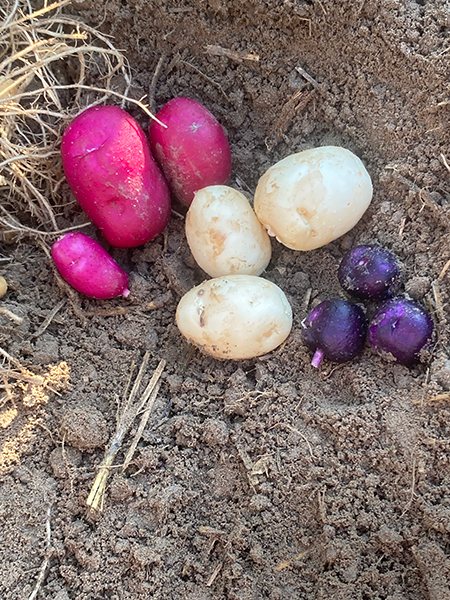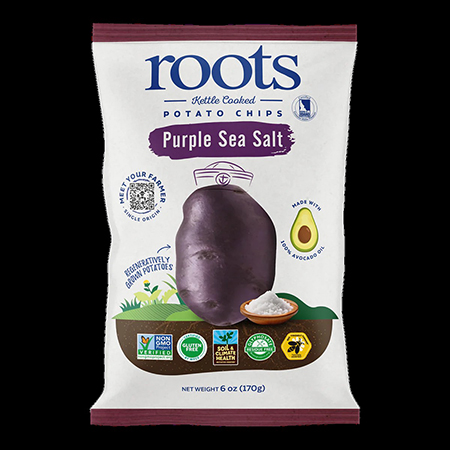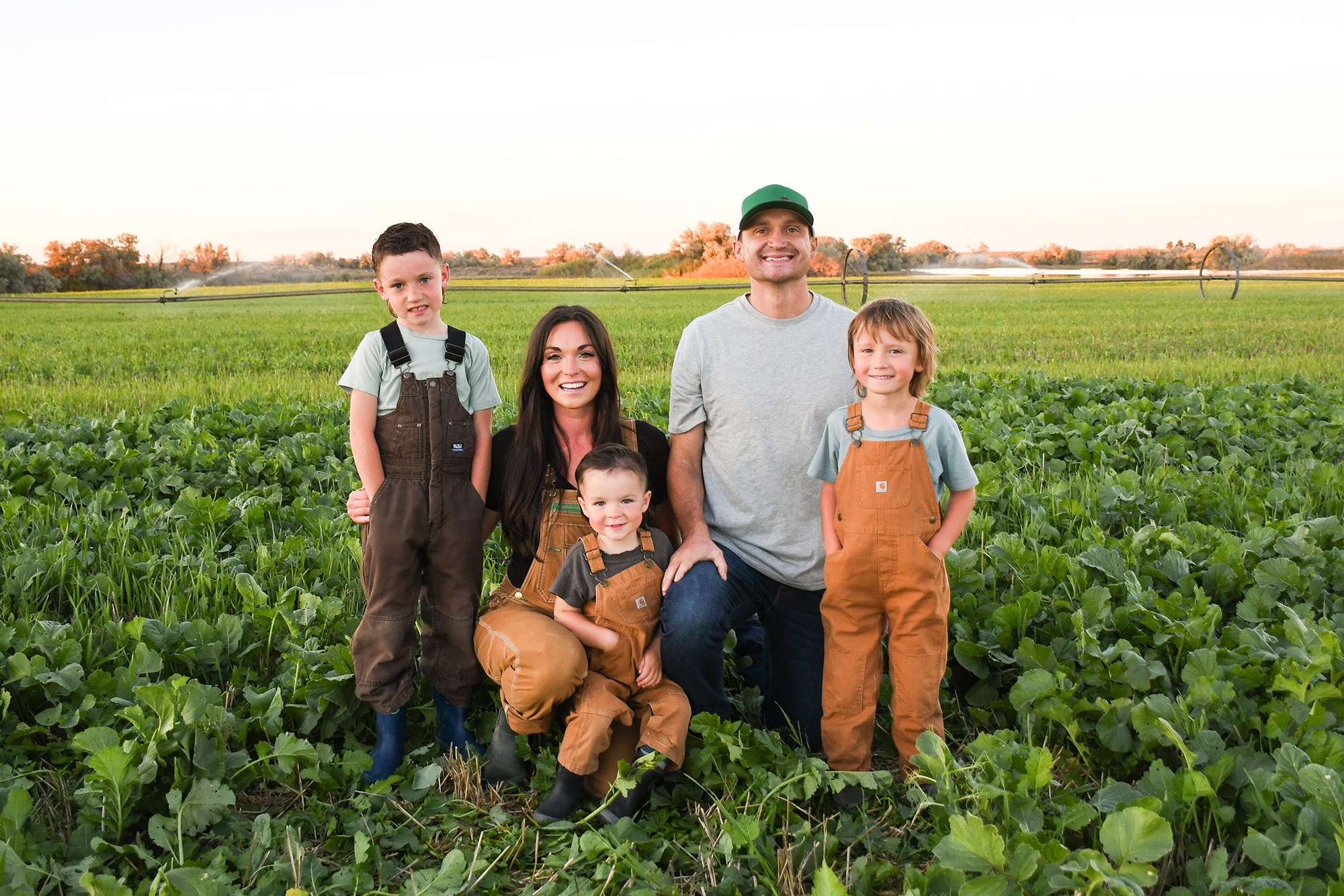Farm’s Roots Potato Chips are one of the first brands to receive Soil & Climate Health Initiative verification
Applying regenerative agriculture practices to conventional potato farming is challenging. A root crop, potatoes require tillage, which is minimized in regenerative agriculture. They are also sprayed with lots of pesticides. Crop rotations are minimal with just potatoes and wheat, and cover crop plantings are rare.
But one Idaho potato farm is successfully applying regenerative methods, providing a model for how it can be done, and offering one of the first Soil & Climate Health Initiative Verified products: Roots Potato Chips.
Healthier soils that retain more water and are more resilient

Ladd Wahlen’s red, white, and purple potatoes
The farm is owned by Ladd Wahlen and his family who live in Aberdeen, Idaho. Wahlen had an early interest in natural farming methods. While in college, he wrote a paper describing how oilseed radish cover crops release compounds that suppress nematodes thus eliminating the need for chemical fumigation, a common practice in potato production.
“I thought that was so cool,” Wahlen says. “When I got home and started farming, we got right into cover crops and minimum tillage.”
Wahlen’s farm has other big contrasts with conventional potato production. His farm has 10 times the diversity of conventional farms.
“We’re trying to incorporate 12 to 14 species of cover crops. We’re trying to get as much diversity as we can,” Whalen says.
Cover crops include legumes, winter peas, vetch, clover, buckwheat, grasses, and radish. His crop rotation, in addition to potatoes, includes alfalfa and wheat.
Wahlen maintains living roots in the ground—a key pillar of regenerative agriculture—for up to 90% of the year compared to only 33% of conventional potato farms. He has reduced tillage by 75% compared to conventional farms. Using cover crops and compost, Wahlen has significantly reduced the need for synthetic fertilizers. He doesn’t use any synthetic pesticides on his potatoes. Beyond that, 25% of his farm is certified organic.
Wahlen says regenerative practices have produced healthier soils that retain more water and are more resilient despite weather fluctuations. There are benefits to the environment and human health.
“The soil diversity and cover crops attract more wildlife and restore ecosystems,” he says. “Regenerative agriculture yields more nutrient dense food, which leads to healthier whole foods and snacks.”
Wahlen’s innovative regenerative approach led his farm to become a model potato farm with the Nature Conservancy.
“Since potatoes are such a big deal in Idaho, the Nature Conservancy was looking for a partner, and they had read about our work. We connected and it was a good fit,” Wahlen says.
The Nature Conservancy established a 45-acre section of Wahlen’s farm as a demonstration project where Wahlen can demonstrate his practices and share ideas with other growers in his area.
“We want to bring in neighboring farms and help introduce them to some of these practices,” he says. “And do it in a way that it could be more profitable for them versus raising just conventional potatoes.”
Taylor Herren, program specialist at the Soil & Climate Initiative, calls Wahlen a visionary. “He’s very much modeling (regenerative) potato production, and building a value-added business out of it as well.”
SCI verification “checked all the boxes”

Roots Chips brand potato chips display the Soil & Climate Health Initiative Verified seal.
Wahlen’s value-added business is Roots Chips, a potato brand he launched in 2021 using his regenerative potatoes. The chips are processed in a small manufacturing facility on his farm. The Roots Chips product line includes Sea Salt, Barbecue, Purple Sea Salt, Jalapeño, and Sea Salt and Vinegar.
Roots Chips are currently sold in natural food stores and cooperatives and retail chains like Whole Foods, Wal-Mart, Kroger, and Albertson’s in Idaho and surrounding states.
“We’re currently working on some expansion plans, and our hopes are that we’ll be able to source outside potatoes,” Wahlen says.
Wahlen saw regenerative certification as a way to validate his regenerative practices and help Roots Chips stand out in the marketplace.
“With regenerative becoming more mainstream, some certifications came out, and we thought that it is a good opportunity to set ourselves apart and tell our story about how we farm,” he says.
He investigated several different regenerative certifications and chose Soil & Climate Initiative (SCI) because it “checked all the boxes.”
“It was perfect timing for us,” Wahlen says. “Their program aligned with what we are doing. It seemed like a good partnership.”
To earn SCI verification, farms track soil health outcomes, use practices that protect and nourish the soil, and commit to continuous improvement over the long-term. SCS Global Services, an independent third-party verifier, confirms that on-farm activities and monitoring meet the requirements of the program. Verified food brands can display the Soil & Climate Health Initiative Verified label.
It was a back-and-forth process with the SCI team. “We went through their standards,” Wahlen says. “We spent a lot of time creating field and farm plans, doing all the requirements to become certified.”
Overall, he says it was a smooth process. “We were implementing most of the (regenerative) practices already.”
“One of the exciting things about having Ladd in the verification program is that SCI is a continuous improvement model, and he’s been setting goals for how he can continue to improve and regenerate the soil over the next several years,” says Adam Kotin, SCI managing director.
First brand to display Soil & Climate Health Initiative Verified seal
Verified seal on its products. Wahlen hopes that having the verification will help his products get shelf space in more natural food retailers, particularly the larger chains like Whole Foods, Sprouts Farmers Market, and Natural Grocers.
“A lot of the natural retailers have increasing interest in regenerative products,” he says. “That was definitely a big part of why we wanted to get verified.”
Whole Foods Market requires that products making regenerative claims be third-party certified to be sold in the company’s stores. Whole Foods currently recognizes Regenerative Organic Certified and Regenefied as acceptable regenerative certifications and is in the process of reviewing SCI for acceptance also.
Going forward, Wahlen wants to work with and source potatoes from neighboring potato farms to expand his business and advance regenerative farming in his region.
“We want to introduce neighboring farms to and help them adopt some of these climate friendly practices and hopefully get them certified,” he says. “We want to make it a collaborative benefit for growers in the area and be able to provide a good product for the natural grocery channel.”
Farmers like Ladd Wahlen are key to advancing regenerative agriculture. “Having growers like the Wahlens as hubs for their community, that’s actually how this regenerative work scales,” Kotin says. “It’s having a local focus to build a national and global impact.”





